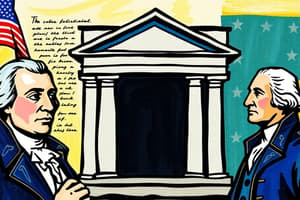Podcast
Questions and Answers
What was the main aim of the Alien and Sedition Acts?
What was the main aim of the Alien and Sedition Acts?
- They prevented people from being citizens of the United States
- They were meant to punish the federalists who supported the National Bank
- They provided a means to safely protect the country from French invasion
- They were aimed at people who were criticizing President Adams' foreign policy (correct)
In his Farewell Address, what did Washington urge future American leaders to do?
In his Farewell Address, what did Washington urge future American leaders to do?
- Remind citizens to be tolerant of their differences
- Prevent the US from entering into foreign relations
- Keep freedom of religion the most important American right
- Let morality guide their future foreign policy decisions (correct)
What is the best explanation for the limited role of the government in the national economy following the American Revolution?
What is the best explanation for the limited role of the government in the national economy following the American Revolution?
- It emerged as the best strategy to pay off war debts to Great Britain
- It evolved as an effort to compete with the French as they expanded westward
- It evolved as a reaction to the oppressive economic policies that existed during the colonial era (correct)
- It was a compromise between the industrial North and agricultural South
What was the first major domestic crisis of the US government under the Constitution caused by?
What was the first major domestic crisis of the US government under the Constitution caused by?
Why did Hamilton argue that a Bill of Rights was not necessary?
Why did Hamilton argue that a Bill of Rights was not necessary?
According to George Washington's Farewell Address, which is most important for sustaining the United States?
According to George Washington's Farewell Address, which is most important for sustaining the United States?
What was significant about the Whiskey Rebellion in US history?
What was significant about the Whiskey Rebellion in US history?
Based on Washington's diplomatic philosophy, the United States did NOT become involved in which conflict?
Based on Washington's diplomatic philosophy, the United States did NOT become involved in which conflict?
Based on his Farewell Address, what was George Washington wary of?
Based on his Farewell Address, what was George Washington wary of?
What was the diplomatic controversy involving John Adams and France known as?
What was the diplomatic controversy involving John Adams and France known as?
Why were the Alien and Sedition Acts controversial?
Why were the Alien and Sedition Acts controversial?
What was politically significant about Alexander Hamilton's plan for a national bank?
What was politically significant about Alexander Hamilton's plan for a national bank?
What was the major reason for conflicts regarding domestic issues between Thomas Jefferson and Alexander Hamilton?
What was the major reason for conflicts regarding domestic issues between Thomas Jefferson and Alexander Hamilton?
Which early American political party was led by Thomas Jefferson and James Madison, favored stronger state governments, and was supported by planters, farmers, and craftsmen?
Which early American political party was led by Thomas Jefferson and James Madison, favored stronger state governments, and was supported by planters, farmers, and craftsmen?
Which early president passed the unpopular Alien & Sedition Acts, which restricted people speaking out against the government?
Which early president passed the unpopular Alien & Sedition Acts, which restricted people speaking out against the government?
On what belief did Alexander Hamilton base much of his financial program?
On what belief did Alexander Hamilton base much of his financial program?
When Virginia and Kentucky refused to follow federal law, they were practicing what?
When Virginia and Kentucky refused to follow federal law, they were practicing what?
Alexander Hamilton and Thomas Jefferson disagreed over the proposed National Bank based on which issue?
Alexander Hamilton and Thomas Jefferson disagreed over the proposed National Bank based on which issue?
Which of these is an example of sectionalism?
Which of these is an example of sectionalism?
This quotation represents a major principle of US foreign policy known as _____, first espoused by President George Washington.
This quotation represents a major principle of US foreign policy known as _____, first espoused by President George Washington.
The XYZ Affair (1797) led to near formal war with which country?
The XYZ Affair (1797) led to near formal war with which country?
The political followers of Thomas Jefferson took up the name 'Democratic-Republicans' preferring what?
The political followers of Thomas Jefferson took up the name 'Democratic-Republicans' preferring what?
Which early American political party was led by Alexander Hamilton, favored a strong central government, and was supported by businessmen, bankers, and merchants?
Which early American political party was led by Alexander Hamilton, favored a strong central government, and was supported by businessmen, bankers, and merchants?
When Madison refers to 'faction' in Federalist No. 84, he is MOST likely referring to what?
When Madison refers to 'faction' in Federalist No. 84, he is MOST likely referring to what?
Which action is an example of American leaders following President Washington's advice in his Farewell Address?
Which action is an example of American leaders following President Washington's advice in his Farewell Address?
What main objection is Hamilton addressing in Federalist No. 84 regarding a Bill of Rights?
What main objection is Hamilton addressing in Federalist No. 84 regarding a Bill of Rights?
In the 1790 excerpt, James Madison MOST directly opposes which economic proposal?
In the 1790 excerpt, James Madison MOST directly opposes which economic proposal?
Which of these is one way President Washington helped to calm citizens' anxiety in his Farewell Address?
Which of these is one way President Washington helped to calm citizens' anxiety in his Farewell Address?
Which of these would have MOST favored the financial plans of Alexander Hamilton?
Which of these would have MOST favored the financial plans of Alexander Hamilton?
Political parties appeared in the US shortly after the Constitution was adopted because of what?
Political parties appeared in the US shortly after the Constitution was adopted because of what?
Which of these BEST describes the purpose of the Alien and Sedition Acts?
Which of these BEST describes the purpose of the Alien and Sedition Acts?
Flashcards are hidden until you start studying
Study Notes
Political Foundations of the United States
- Alexander Hamilton's national bank plan initiated intense political debate over constitutional interpretation, leading to a divide between strict and loose constructionists.
- Conflicts between Thomas Jefferson and Hamilton centered on constitutional interpretation, specifically over the powers of the federal government.
- The Democratic-Republican Party, formed by Jefferson and Madison, advocated for stronger state governments and represented the interests of farmers and craftsmen.
Early Political Parties
- The Federalist Party, led by Hamilton, supported a strong central government and garnered backing from businessmen and merchants.
- John Adams, a Federalist, enacted the controversial Alien & Sedition Acts, limiting free speech against the government and allowing the deportation of foreign nationals.
- Sectionalism arose as different regions developed distinct economies, focusing on local rather than national interests.
U.S. Foreign Policy and National Identity
- Washington's farewell address emphasized neutrality, advising against permanent alliances to safeguard American interests.
- The XYZ Affair heightened tensions with France and nearly led the U.S. to war, highlighting early foreign policy challenges.
- Washington recognized the importance of religion as a moral guide for maintaining political and social order in America.
Constitutional Debates and Rights
- Hamilton argued that the new Constitution inherently safeguarded citizens' rights, claiming a Bill of Rights was unnecessary.
- Economic disagreements post-Revolution led to partisan divisions, shaping the emergence of established political parties and ongoing conflicts over governance.
Significant Challenges and Precedents
- The establishment of a National Bank became a cornerstone of Hamilton's financial strategy, but spurred controversy regarding federal authority and states' rights.
- Washington set the precedent of a two-term limit for presidential service, influencing future presidents until the 22nd Amendment formalized it in 1951.
- The Alien and Sedition Acts reflected government efforts to maintain order during political unrest, particularly against critics of foreign policy.
Political Dynamics and Voter Sentiments
- The Democratic-Republicans emphasized states' rights and opposed Hamilton’s financial policies, positioning themselves against Federalist ideals.
- The concept of nullification emerged when states like Virginia and Kentucky challenged federal laws, foreshadowing later sectional conflicts.
- Madison's concerns over factions in Federalist No. 10 alluded to the growing political parties, underpinning the complexities of American democracy.
Washington's Leadership and Legacy
- Washington cautioned against political parties and sectionalism, recognizing their potential to divide the nation.
- The Farewell Address served as a guiding document influencing future American political philosophy and foreign policy decisions.
- Hamilton’s financial acumen helped stabilize the early American economy but also deepened regional divides and set the stage for future political struggles.### Compromise and Conflict
- A compromise arose between the industrial North and agricultural South, reflecting tensions in early American politics.
- Hamilton and Jefferson aimed to protect citizens from the economic tyranny faced during colonial rule.
Early Government Crises
- The first major crisis under the Constitution was the Whiskey Rebellion, prompted by a tax on whiskey.
- Shays' Rebellion occurred from August 1786 to June 1787, leading to the ratification of the Constitution in June 1788 and culminating in the Whiskey Rebellion from 1791 to 1794.
Bill of Rights Debate
- Hamilton argued a Bill of Rights was unnecessary since national and state constitutions already guaranteed rights.
- He believed that an explicit Bill of Rights could restrict personal freedoms by setting limits on rights.
Washington's Farewell Address
- Washington emphasized the unity of the states as crucial for national sustainability, warning that it would be an area frequently attacked by enemies.
Significance of the Whiskey Rebellion
- The Whiskey Rebellion illustrated the federal government's commitment to enforcing laws through military force.
- It established the supremacy of the national government as outlined in Article VI of the Constitution.
Foreign Relations Stance
- Washington's diplomatic philosophy led the US to avoid involvement in the French Revolution, advocating for neutrality and restraint in foreign alliances.
Warning Against Political Parties
- Washington cautioned against political parties, fearing they could overshadow the collective will of the nation and lead to factionalism.
XYZ Affair
- The XYZ Affair involved American diplomats being demanded a bribe and a loan by French agents, leading to public outrage in the United States and perceived as a diplomatic insult.
Alien and Sedition Acts Controversy
- The Alien Act allowed deportation of aliens viewed as threats, while the Sedition Act criminalized criticism of the government.
- Both acts faced backlash for allegedly violating the Constitution, as they restricted civil liberties and free speech.
Studying That Suits You
Use AI to generate personalized quizzes and flashcards to suit your learning preferences.




